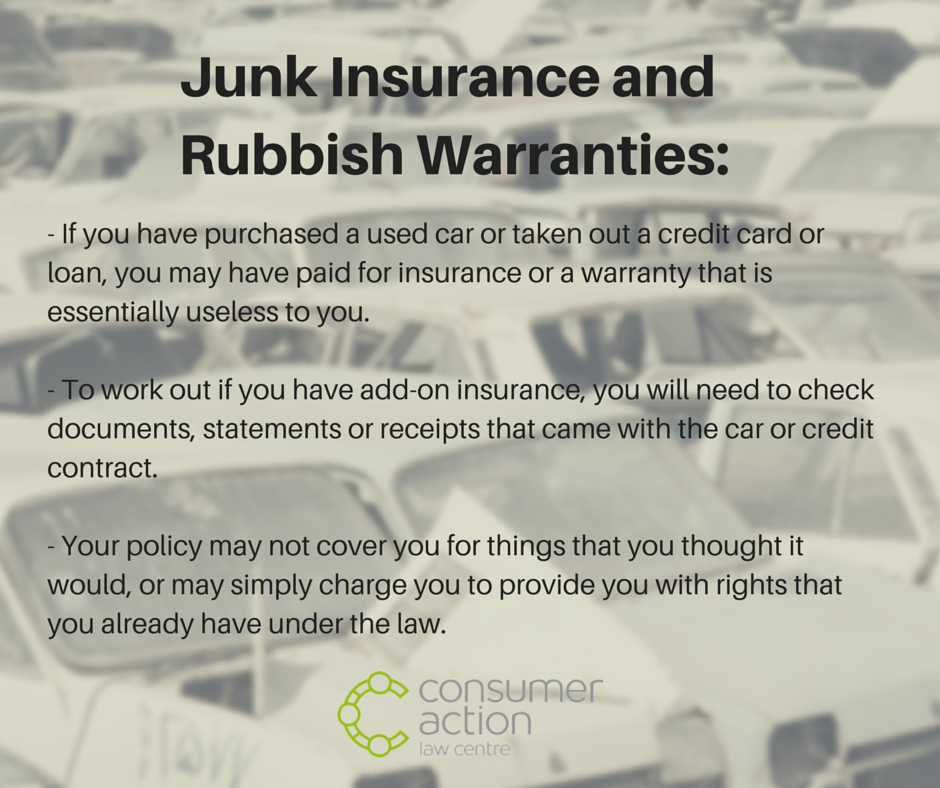Junk Insurance and Rubbish Warranties
You might have bought something useless and don’t even know it. If you’ve purchased a used car or taken out a credit card or loan, you may have paid for some junk insurance or a rubbish warranty that is essentially useless to you.
It’s even easier to complain – use our free tool at DemandARefund.com
Motor vehicle dealers and finance companies often add insurance or warranties onto loans. Common examples are motor vehicle ‘warranties’ or consumer credit insurance* and gap insurance** that are added onto loans with the rest of the paperwork. Often you pay premiums for cover you don’t really understand. Worse still, you might be sold the cover without even knowing you’ve bought it. In many of these situations, you’ve been paying premiums for cover which is essentially useless to you.
Am I affected?
Follow this step-by-step guide to work out if you are paying premiums for junk insurance or rubbish warranties that are essentially useless to you.
1. Check your documents.
Insurance can be added to loans or credit cards, often to car loans. You can check your loan documents, credit card statements or purchase receipts, or you can ask the motor vehicle dealer, loan provider or bank you dealt with.
Click here for some tips about accessing your loan documents.
These products cost hundreds or thousands of dollars so it is worth taking a look. Remember also that if the premium has been added to a loan, you will also be paying interest on this amount as well.
2. Am I covered by the policy?
Check if you meet the basic policy requirements. You can look at your Product Disclosure Statement (PDS) or ask your insurer / warranty provider.
Motor vehicle extended warranties often have very strict mechanical servicing requirements. If you have not complied with the servicing requirements, the provider might be able to decline your claim. These warranties also impose limits on what parts of the car are covered and limit how much the warranty will pay for certain parts.
But some warranties may not really provide any cover at all – see below for more info.
Your personal circumstances might restrict your cover under consumer credit insurance policies, for example:
- Your age.
- Your employment status – unemployed, casual, contract, self-employed.
- If you have a pre-existing condition.
3. Does the policy provide any meaningful cover?
Check the wording of your policy to see if it covers what you need. Sometimes policies do not provide the cover a consumer expects. For example, some motor vehicle warranties, known as ‘discretionary risk products’, give the provider an absolute discretion about whether or not they will pay claims. This means that you may not be paid, even if your claim falls within the terms and conditions of the warranty. Sometimes warranties give less protection than a consumer already has under the consumer guarantee provisions of the Australian Consumer Law.
Click here to learn more about motor vehicle extended warranties.
The insurance cover you have bought might be a reasonable product but still unnecessary for you. For example, consumer credit insurance usually provides some life insurance, but you may not need this if you already have life insurance through your superannuation. Check the wording of your policy and/or ask the company that issued the policy if you are unsure about the terms of your policy.
4. Is it worth it?
Work out or ask for the full cost of the insurance.
Consider whether the cover provided is worth it for you taking into account your own requirements and objectives.

Take Action
We want to hear your stories.
We would like to hear from you if you’ve recently been sold:
- a motor vehicle warranty through a car dealer or a car loan; or
- consumer credit insurance where the cover isn’t suitable for you due to the factors set out above
- any ‘add-on’ insurance in circumstances where you were told it was compulsory.
To get in touch, please email campaigns@consumeraction.org.au
You can complain if you think you have been treated unfairly.
If you think you have a complaint against an insurer, warranty provider or a credit provider who sold you an insurance product, you can raise your complaint directly with the relevant business first. Details of how to make a complaint should be on their website or in the paperwork you received when you bought the insurance, extended warranty or credit product.
If you are unhappy with the response from the insurer, warranty company or credit provider, you can complain to the Financial Ombudsman Service, which provides free, independent dispute resolution.
Further assistance
If you need further help and you live in Victoria you can contact us for legal advice. If you are outside of Victoria, you can contact someone in your state for assistance.
Consumer Action Law Centre
Telephone: (03) 9629 6300, or 1800 466 477 for country and mobile phone callers.
You can also use our online form to send us an email.
If you are deaf or have a hearing or speech impairment, you can call through the National Relay Service (NRS):
- TTY users can phone 133677 then ask for 1800 466 477
- Speak & Listen (speech-to-speech) users can phone 1300 555 727 then ask for 1800 466 477
- Internet relay users can connect to NRS on www.relayservice.com.au then ask for 1800 466 477
This fact sheet is for information purposes only and should not be relied upon as legal advice. This information applies only in Victoria and was updated on December 31 2015.
*Consumer credit insurance is designed to protect a consumer’s ability to meet their credit repayments in the event of death and/or involuntary unemployment and/or permanent disablement. The benefits are generally paid directly to the finance provider.
**GAP insurance generally provides cover if a motor vehicle is written off. It is designed to cover the difference between what your insurer pays out and what you owe on the loan.

